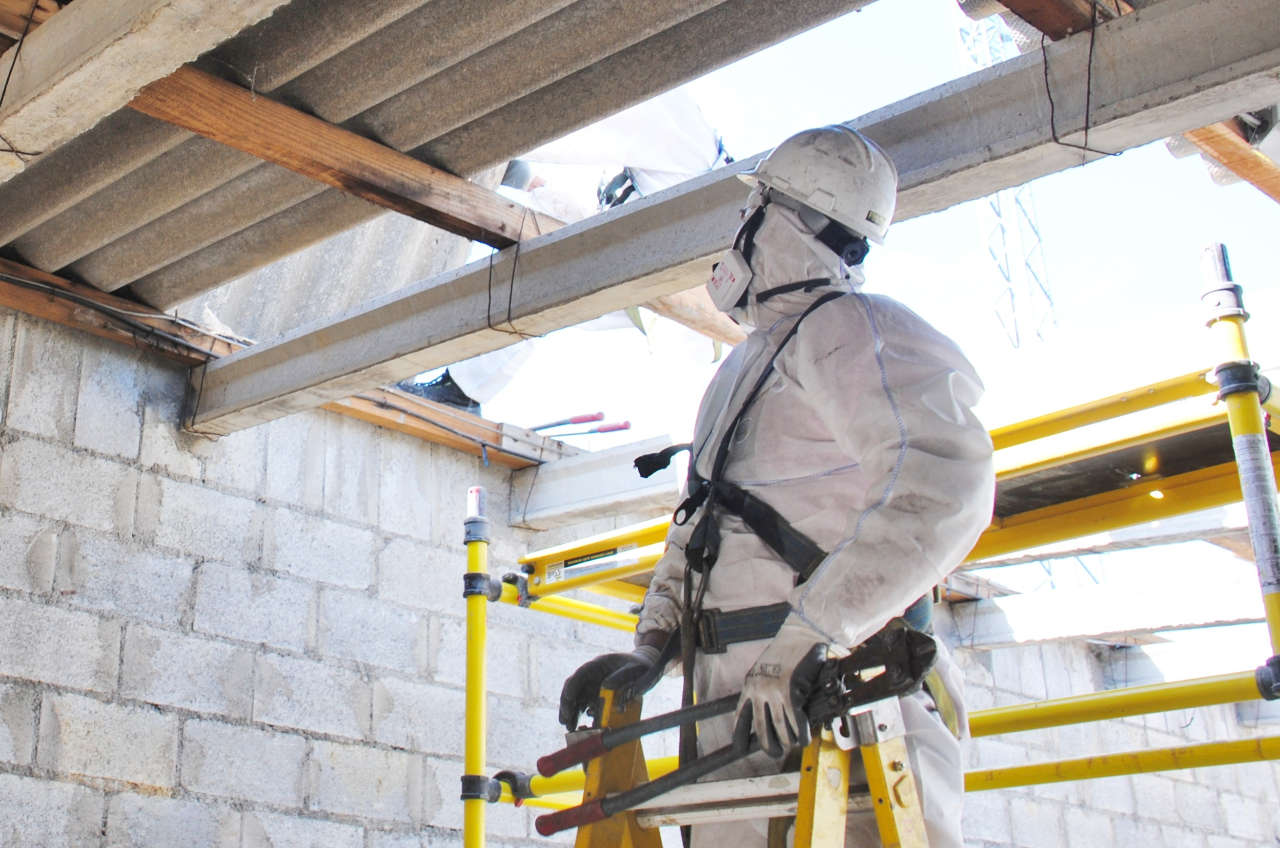
Asbestos exposure can be fatal. Read our guide on identifying and managing asbestos exposure risks in the workplace, including duty holders’ responsibilities for controlling asbestos exposure, risk assessments, and training.
Despite being banned as a construction material in 1999, asbestos is the leading cause of UK workplace deaths, with 5,000 workers killed every year due to asbestos exposure and 20 tradespeople dying every week due to past asbestos exposure.
Asbestos-containing materials (ACMs) can be present in buildings built or refurbished before the year 2000.
Common places for asbestos to be present include:
- Ceiling tiles and voids, partition walls and fire door panels.
- Insulation, such as lagging for boilers and pipes.
- Asbestos cement, used in gutters, roofing and water tanks.
- Textiles such as fire blankets and vinyl floor tiles.
- Sprayed coatings, such as on ceilings, beams, walls and columns.
If asbestos is in good condition, is well managed and remains undisturbed, it poses no risk. However, if the material is disturbed or damaged, this can lead to invisible fibres being released into the air and subsequently inhaled, which can prove extremely dangerous to individuals and a wider population. People who inhale the fibres can suffer from serious diseases including asbestos-related lung cancer and mesothelioma.
The harmful fibres in asbestos cannot be smelt or tasted, and are not visible to the naked eye. Related diseases and harm can take decades to develop. Anyone who has been exposed to asbestos may not know they’ve been affected until years later when the harm from the material then takes effect.
How to identify and manage asbestos exposure risks
It is vital that employers, building owners and tradespeople understand how to identify and manage asbestos risks, and follow safe work practices when managing asbestos.
Duty holders responsibilities for managing asbestos exposure
Employers must follow safe working practices and manage asbestos effectively. The Control of Asbestos Regulations 2012 place legal responsibilities on the duty-holders of non-domestic, industrial, commercial and public buildings with asbestos-containing materials (ACMs). The regulations also apply to the shared parts of some domestic premises such as foyers, corridors and lifts in purpose-built flats.
Duty-holders must identify and manage asbestos by carrying out risk assessments typically based on asbestos surveys, taking action to manage the risks that might include removing asbestos or controlling the risks posed by asbestos through an asbestos management plan, as well as providing asbestos awareness training for employees.
They must prevent exposure to asbestos fibres or keep the risk as low as possible and maintain up-to-date written records of the location and condition of asbestos materials or those presumed to contain it. This normally takes the form of an asbestos register and an asbestos management plan.
A risk assessment must be carried out before work that could accidentally disturb asbestos takes place, and any work on asbestos must only be undertaken by those who are competent and/or licensed. The assessment must establish the risks and who could be affected, with a plan of action to manage the risks created and recorded.
Failing to have a plan for dealing with asbestos can result in a fine of up to £20,000 or up to six months imprisonment. Duty-holders who seriously breach the regulations face an unlimited fine and/or two years in prison.
Managing and reducing the risk of asbestos exposure
The Control of Asbestos Regulations 2012 place many responsibilities on employers and duty holders because asbestos is such a dangerous material. Therefore, it is crucial that employers and duty holders understand how to identify and manage asbestos.
How to identify and manage asbestos – risk assessments
If an employee’s normal work may mean that they could accidentally expose themselves and others through damaging or disturbing ACMs or repair, maintenance or other work is to be carried out to the building or plant and equipment that could do the same, a risk assessment must be carried out to identify where ACMs may be present and create a plan for preventing and controlling the established risk. The assessment must be done by a competent person who is suitably knowledgeable about and trained in the dangers of asbestos.
The Health and Safety Executive says whoever carries out the assessment must:
- Make sure it is job-specific and considers the full scope of the work;
- Establish the extent of potential risks and who could be affected;
- Identify the steps taken to remove the risk or reduce the risk if that is not possible;
- Record significant findings in writing (electronic or paper);
- Communicate significant findings to employees and anyone else who could be affected in an understandable way to minimise risks to them or to take appropriate precautions to reduce/remove the risk before work begins;
- Review the assessment regularly and update it as required.
How to identify and manage asbestos risks
Risk assessments must identify the types, quantity and condition of the asbestos present and the expected level of exposure.
Information on the building and whether it contains asbestos can be gathered by examining records of previous asbestos work and contacting previous owners or tenants, facilities management companies, previous suppliers and the building designer or architect.
If no records are available, or there are doubts about the accuracy or relevance of existing documents, employers may need to arrange a new management or refurbishment/demolition asbestos survey.
It may be sufficient for the assessment to be carried out by the duty-holder or another competent employee in small and simple premises. If there is any doubt it may be essential to engage an external qualified asbestos surveyor or if the premises is larger or more complicated.
Read our guide on how to identify and test for asbestos.
The Health and Safety Executive says a survey should be “comprehensive and systematic”. There are two types of survey; a management survey, for normal day-to-day occupation and maintenance of a building, and a refurbishment and demolition survey, which is used if premises are set to be upgraded or refurbished or if demolition work is planned.
Material samples are required only for refurbishment and demolition surveys. Samples should be handled only by trained asbestos experts.
The entire building, both inside and out, should be checked. Products that could contain asbestos should also be checked, and some older plant and equipment may also have ACMs within them that could be exposed if they are removed, such as asbestos gaskets and seals.
If you are unsure whether a material contains asbestos, you should assume it does until proven otherwise.
From the inspection and survey results, an ‘asbestos register’ should be created in written or electronic form. It should record details including:
- The condition and location of the ACM.
- The type of asbestos:
Chrysotile: known as white asbestos.
Amosite: known as brown asbestos.
Crocidolite: known as blue asbestos. - Material and priority score for each ACM.
The register should also include an accurate drawing of the premises with the location of the ACMs indicated.
The Health and Safety Executive provides an asbestos register template and a material and priority scores checklist.
Asbestos management plan
An asbestos management plan must be created and include:
- Your asbestos register.
- Who is responsible for managing asbestos.
- Instruction that no work can begin on the building until the relevant parts of the register are checked and all work must be completed by competent asbestos-trained contractors.
- Plans for any work identified by the assessment such as repairing, protecting or removing ACMs.
- The schedule for monitoring the condition of ACMs.
- How relevant people will be informed about asbestos management.
The management plan can be written or recorded electronically. As a minimum, the plan must be reviewed every 12 months. It should be updated when work is carried out that affects ACMs. An example asbestos management plan is available from the HSE.
Once the plan is in place, you must inform all relevant people. You should tell your employees and all workers who will carry out maintenance on the building including builders, plasterers, electricians and plumbers. It should also be made available to the emergency services, and signs and labels should be placed on anything that contains or might contain asbestos where this is appropriate and shouldn’t be the main approach to asbestos management.
Asbestos awareness training
Employers have a duty to provide employees with adequate training to protect themselves and others from accidental exposure to ACMs or when licensed to remove or work near asbestos.
The three main types of training are:
- Asbestos awareness.
- Non-licensable work with asbestos.
- Licensable work with asbestos.
Asbestos awareness training should be provided to any employee whose work is likely to expose them to ACMs on or within premises, such as maintenance, repair, and refurbishment.
Developed by specialist health and safety consultants, our Asbestos Awareness training provides employees with an understanding of what asbestos is, where it is likely to be found, how they might be exposed to it, how to avoid exposure and the steps to take if they encounter ACMs.
Non-licensed work is activity with ACMs usually carried out by tradespeople such as demolition workers, construction workers, electricians and plumbers. They should receive task-specific training.
Asbestos licensed contractors will ensure that their employees undertaking licensable work with asbestos must be provided with specific training. They must also have a license from the Health and Safety Executive.





